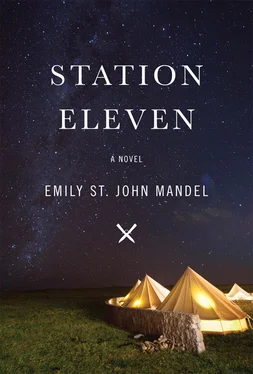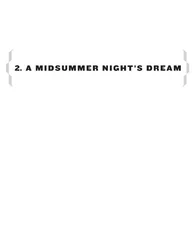“There’s some space in the back row,” Kirsten said, and François followed her.
“What’s the program tonight?”
“A Beethoven symphony. I’m not sure which one.”
At some undetectable cue, the musicians stopped practicing and tuning and talking among themselves, took their places with their backs to the water, and fell silent. A hush came over the assembled crowd. The conductor stepped forward in the stillness, smiled at the audience and bowed, turned without a word to face the musicians and the bay. A seagull glided overhead. The conductor raised her baton.
THAT NIGHT, IN THE SUMMER OFYear Fifteen, Jeevan Chaudhary was drinking wine by a river. The world was a string of settlements now and the settlements were all that mattered, the land itself no longer had a name, but once this had been part of the state of Virginia.
Jeevan had walked a thousand miles. In Year Three he’d wandered into a settlement called McKinley, named by the town’s founders. There had been eight of them originally, a sales team from the marketing firm of McKinley Stevenson Davies, stranded on an isolated corporate retreat when the Georgia Flu swept over the continent. A few days out of the retreat they’d found an abandoned motel on a disused stretch of road far from major highways, and it had seemed as good a place to stop as any. The sales team had moved into the rooms and stayed there, at first because those early years were terrifying and no one wanted to live too far from anyone else; later out of habit. There were twenty-seven families here now, a peaceful settlement across the road from a river. In the summer of Year Ten, Jeevan had married one of the settlement’s founders, a former sales assistant named Daria, and this evening she was sitting with him and a friend of theirs on the riverbank.
“I don’t know,” their friend was saying now. “Does it still make sense to teach kids about the way things were?” His name was Michael, and he’d been a truck driver once. McKinley had a school, ten children who met daily in the largest motel room, and his eleven-year-old daughter had come home crying that afternoon, because the teacher had let slip that life expectancies were much longer before the Georgia Flu, that once sixty hadn’t been considered particularly old, and she was scared, she didn’t understand, it wasn’t fair , she wanted to live as long as people used to.
“I’m honestly not sure,” Daria said. “I think I’d want my kid to know. All that knowledge, those incredible things we had.”
“To what end, though?” Michael accepted the wine bottle from her with a nod. “You see the way their eyes glaze over when anyone talks to them about antibiotics or engines. It’s science fiction to them, isn’t it? And if it only upsets them—” He broke off to drink wine.
“Maybe you’re right,” Daria said. “I suppose the question is, does knowing these things make them more or less happy?”
“In my daughter’s case, less.”
Jeevan was only half-listening. He wasn’t quite drunk. Just pleasantly at ease, after what had actually been a fairly ghastly day: a neighbor of theirs had fallen off a ladder that morning, and Jeevan, as the closest thing to a doctor in a one-hundred-mile radius, had had to set the man’s broken arm. Horrible work, the patient drunk on moonshine but still half-crazed with pain, moans escaping around the piece of wood clamped between his teeth. Jeevan liked being the man to whom people turned in bad moments, it meant a great deal to him to be able to help, but the physical pain of the post-anesthesia era often left him shaken. Now fireflies were rising from the tall grass on the riverbank, and he didn’t want to talk, not really, but it was pleasant to rest in the company of his friend and his wife, and the wine was blunting the worst of the day’s memories — sweat beading on the patient’s forehead as Jeevan set the broken bone — as was the gentle music of the river, cicadas in the trees, the stars above the weeping willows on the far bank. Even after all these years there were moments when he was overcome by his good fortune at having found this place, this tranquility, this woman, at having lived to see a time worth living in. He squeezed Daria’s hand.
“When she came home crying today,” Michael said, “I found myself thinking, maybe it’s time we stopped telling them these crazy stories. Maybe it’s time we let go.”
“I don’t want to let go,” Jeevan said.
“Is someone calling you?” Daria asked.
“I hope not,” Jeevan said, but then he heard it too.
They followed him back to the motel, where a man had just arrived on horseback, his arm around a woman slumped over in the saddle.
“My wife’s been shot,” he said, and in the way he spoke, Jeevan understood that he loved her. When they pulled the woman down she was shivering despite the heat of the evening, half-conscious, her eyelids fluttering. They carried her into the motel room that served as Jeevan’s surgery. Michael lit the oil lamps and the room filled with yellow light.
“You’re the doctor?” the man who’d brought her asked. He looked familiar, but Jeevan couldn’t place him. He was perhaps in his forties, his hair braided in cornrows that matched his wife’s.
“Closest thing we’ve got,” Jeevan said. “What’s your name?”
“Edward. Are you saying you’re not a real doctor?”
“I trained as a paramedic, before the flu. I apprenticed to a doctor near here for five years, till he decided to move farther south. I’ve picked up what I can.”
“But you didn’t go to med school,” Edward said in tones of misery.
“Well, I’d love to, but I understand they’ve stopped accepting applications.”
“I’m sorry.” Edward wiped the sweat from his face with a handkerchief. “I’ve heard you’re good. I mean no offense. She’s just, she’s been shot—”
“Let me see if I can help.”
Jeevan hadn’t seen a gunshot wound in some time. By Year Fifteen, the ammunition was running low, guns used rarely and only for hunting. “Tell me what happened,” he said, mostly to distract Edward.
“The prophet happened.”
“I don’t know who that is.” At least the wound was fairly clean, a hole where the bullet had entered her abdomen, no exit wound. She’d lost some blood. Her pulse was weak but steady. “What prophet?”
“I thought the man’s legend preceded him,” Edward said. He was holding his wife’s hand. “He’s been all over the south.”
“I’ve heard of a dozen prophets over the years. It’s not an uncommon occupation.” Jeevan found a bottle of moonshine in the cupboard.
“You sterilizing the equipment with that?”
“I sterilized the needle in boiling water earlier, but I’m going to sterilize it again in this.”
“The needle? You’re sewing her up without getting the bullet out?”
“Too dangerous,” Jeevan said softly. “Look, the bleeding’s just about stopped. If I go in there looking for it, she might bleed out. Safer to leave it in.” He poured some moonshine into a bowl and rubbed his hands with it, ran needle and thread through the alcohol.
“Can I do anything?” Edward was hovering.
“The three of you can hold her still while I’m sewing. So there was a prophet,” he said. He’d found it best to distract the people who came in with his patients.
“He came through this afternoon,” Edward said. “Him and his followers, maybe twenty of them altogether.”
Jeevan remembered where he’d seen Edward before. “You live up on the old plantation, don’t you? I went up there with the doctor a few times, back in my apprenticeship days.”
“Yes, the plantation, exactly. We’re out on the fields, and a friend of mine comes running, says there’s a group of twenty or twenty-two approaching, walking down the road singing some kind of weird hymn. After a while I hear it too, and eventually they reach us. A group of them, smiling, walking all together in a clump. By the time they reach us, they’ve stopped singing, and there are fewer of them than I’m expecting, maybe more like fifteen.” Edward was silent for a moment as Jeevan poured alcohol over the woman’s stomach. She moaned, and a thin trickle of blood left the wound.
Читать дальше












